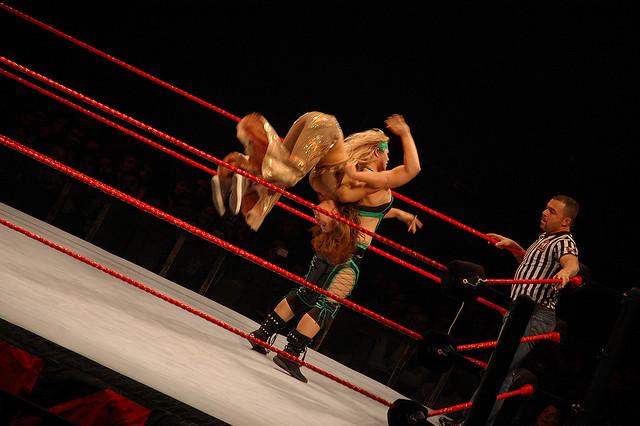
Credit: Flickr
You really ought to watch women's wrestling. It's a slow, sweet dalliance with defiance—a space where women are encouraged to express melancholy and melodrama, earning Twitter feed tut-tuts. Sometimes they even get a fancy gold belt for being the best at screaming and pulling hair.
Women's wrestling has had a recognized world champion since 1937, and since then it's had an irrevocable impact not just on the sport as a whole, but on American culture. In 1984, MTV broadcast "The Brawl to End It All," featuring Wendi Richter vs. Fabulous Moolah in the main event (and the only match broadcasted). It earned a 0.9 Nielsen rating, the highest watched program in the history of MTV.
This was before WrestleMania, and it helped create the demand for WrestleMania . . . not to mention MTV. Hulk Hogan became an international star and got a TV show with a talking boat in part due to the labor of (largely unrecognized, unrespected) women.
I would like, if I may, to take you on a strange journey, through the history and future of women's wrestling, from Las Vegas casino corridors to barbed wire-strewn balconies in Japan. A veritable abyss of menace that gazes back at the patriarchy, even as it superficially services male desires.
GLOW Is Born
Wrestling is a scripted performance; ratings and statistical revelry make it real for us, helping us lose ourselves in the fantasy. But like a Game of Thrones family tree, it has no weight or worth outside of our magic circle. We're not trying to break into that circle—only to create our own instead.
Gorgeous Ladies of Wrestling, aka GLOW, was the first all-women's wrestling promotion. It operated out of the Riviera Hotel in Las Vegas and—in keeping with my promise to spare you from sports fetishism—it had no desire to be a "sport."
The show ran, like a sitcom, on seasons, rather than the full-year touring schedule typical of wrestling. Most wrestlers attended a wrestling school and cut their teeth on low-rent showcases in high school gymnasiums. The cast of GLOW—actresses, models and Olympic hopefuls to start with—were trained together, like the cast of a cat fight heist film. They lived on-site, on a curfew, and had to stay in character when indoors.
Modern wrestling schools come with cautionary tales of 500 daily push-ups, and the cast of GLOW fared no better. Every ounce of their flesh was scrutinized by director Matt Cimber, who wasn't above criticizing the amount of dressing on their salad.
A cavalcade of caged birds, but boy: how they did sing. GLOW took the fight to the mainstream. Their wrestlers had a national tour and appeared on daytime TV to challenge the lack of positive role models for little girls. Resident arch-villain Matilda the Hun, who in the past had to wrestle bears due to athletic commission prohibitions on intergender wrestling, took to the late night circuit to challenge Hulk Hogan or any man anywhere to face her in the ring.
Tina & Ashley vs. Hollywood & Vine aired as part of the pilot episode on September 13, 1986. And it was a fight to remember.
Working Girls Take On The Good Girls
Underneath the eyeshadow and teased hair (keep digging, there's a lot of it), the battle between these four women embody a compelling caricature of classism and misogyny: the rich, congenial "good girls" from Beverly Hills (Tina and Ashley) blowing kisses and throwing kicks at the dirty "working girls" (Hollywood and Vine), whose underhanded, underbelly upbringing force them to resort to clandestine tactics and double teams just to stand a chance against the bona-fide American sweethearts.
We, as the audience, are meant to relate to and root for Tina and Ashley. But for me, it's a different experience to watch Ashley thrown over the ropes and back into the ring, or Tina shown what life is like "on the streets" as she's worked over in tandem by Hollywood and Vine. I see myself, as a trans woman, as a former and occasionally-in-the-present sex worker, in the fishnet-laden knee drops thrown onto Ashley's prone body.
I know Hollywood and Vine are meant to lose, that "evil" is meant to lose—or, if victorious, to win through dubious "you know what would have really happened" means.
But they are making themselves seen. They are, if inadvertently, giving voice to my frustrations, stomping and slapping away at my resentment at a privilege I will never know. I may never get to be a "sweetheart." I may never be "good." But I can make a show of my glib contempt for a life and image I can never attain.
In wrestling, "gimmicks" are often assigned by a writer, but so much responsibility in making that come alive rests with the performer. Mark Calaway, aka "The Undertaker," did not choose the life of a zombie funeral home employee—but a writer could not make him roll his eyes into the back of his head.
Hollywood and Vine were cast as unscrupulous "party girls," but they dressed themselves, in fabric and affect. They chose the sort of lives their characters would have, on film, and in the ring. Whether or not they succeeded "in the script" is secondary to the realness of their performances and the light they shed on their characters' struggles. This speaks to me, as an intersectional feminist, in a very real and almost uncomfortable way.
As an amusing aside, The Housewives, another team of wrestlers in GLOW, were written as sexy housewives, and instead came to the ring in hair curlers and criticized the racy fashion of the audience members.
Where Are They Now?
Hollywood is now an adult performer, making wrestling videos. She starred in Plumbers Don't Wear Ties, one of a few things in the known universe to anger men more than feminism.
After GLOW folded, before its fifth season, Tina went on to become an internationally successful wrestler as Ivory. She won the WWE women's championship three times, often performing as a "wholesome American girl," and now provides boarding and veterinary care for dogs.
Sometimes the script is very compelling. But it's not the measure of success. It's in taking your script and making your portrayal real, personal or even dangerous—either by writing your own lines or just throwing the script out entirely.
Throw it right out of the ring and watch it flail, fatigued, back to the ring—like little Ashley, coming back for seconds of Hollywood and Vine's working class whoop-ass.






